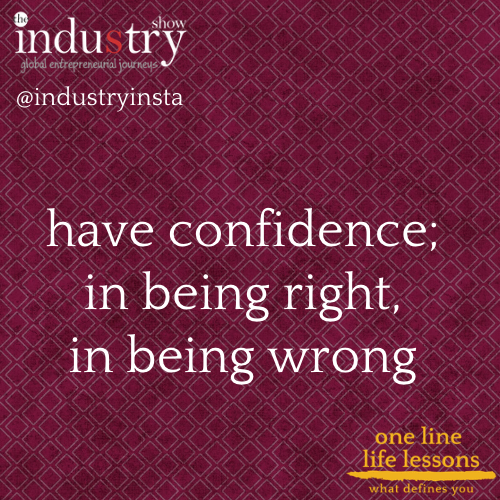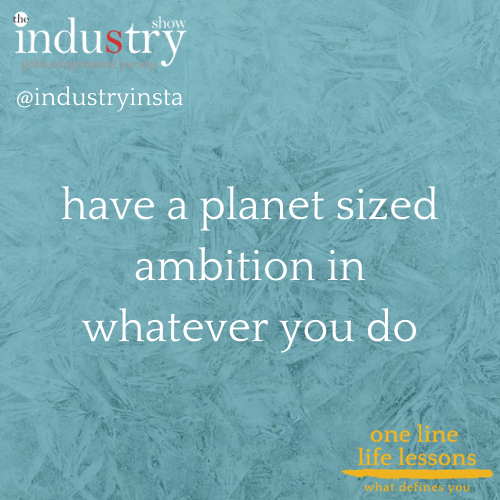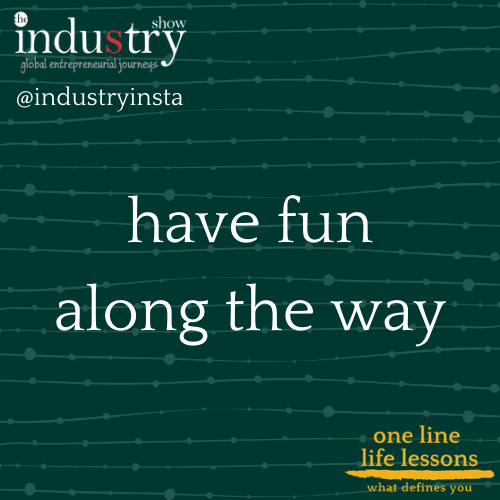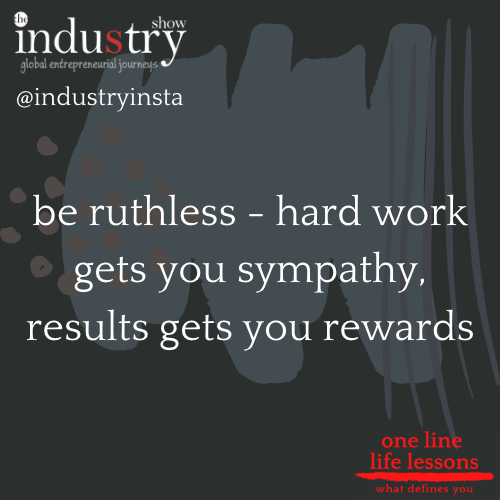Jul 1, 2023
Himanshu Palsule
Himanshu Palsule is the CEO of Cornerstone OnDemand, a top talent management software company. He leads efforts to empower organizations and individuals to excel through continuous learning and innovative HR solutions. Palsule is known for his deep curiosity and collaboration with top talent in the field. Himanshu is also a Board Member at ChannelAdvisor and Calabrio, Inc. Previously, he has held leadership positions at Epicor Software, Sage and Open Systems International. He is an alum of University of St. Thomas and Manipal Institute of Technology.
One Line Life Lessons from Himanshu





Episode Highlights
- 0:00 – Introduction to Himanshu Palsule, CEO of Cornerstone, and the company’s mission.
- 1:20 – Emphasizing the significance of continuous learning and the global impact of Cornerstone’s platform, used by 7,000 customers and over 100 million users.
- 3:45 – Company’s focus on educating the planet, particularly in emerging geographies like India, with a focus on upskilling and training.
- 5:10 – Leading a company with over $1 billion in revenue and the challenges faced in a competitive market, while adapting to changing global dynamics.
- 7:00 – Opportunities presented by artificial intelligence and its long-term impact on learning, including the company’s involvement in AI for the past 4 years and the acquisition of Clustery.
- 9:15 – Reflection on career journey, emphasizing self-reflection and not overextending oneself.
- 11:00 – Importance of having fun along the way and not forgetting the fun factor in life.
- 12:30 – Nitin’s appreciation for Himanshu sharing his values, life lessons, and virtues with the audience, and wishes him continued success.
Show Transcript
Transcript - Full Episode
Nitin Bajaj
Hey, everyone. Welcome to The Industry Show. I’m your host, Nitin Pajaj. And joining me today is Himanshu Palsule. Himanshu, welcome on the show.
Himanshu Palsule
Glad to be here, Nitin. Thanks for having me.
Nitin Bajaj
Pleasure is all ours. Let’s start with who is Himanshu?
Himanshu Palsule
So, Himanshu, well, I’ve been in this industry for about 35 years, seen a lot of change. But even before that, I’m a proud father. I am a loyal husband. I am, a dedicated son, and I’m someone that I hope, you know, in the community and the people that I interact with and influence, I get to have, some impact and serve some purpose. But at the heart of it, you know, been a technologist most of my life, got into management in the early years of, well, my experience. And then currently, I’m the CEO of Cornerstone, which which we can elect to talk about. But, you know, in the social world that we are in today, the ability to always be connected, always learn, always understand, impart a few words of, experience is, you know, what I value most. So when you invited me to the show, I was delighted to be here.
Nitin Bajaj
Himanshu, thank you so much again for being here. And lot of humble words there. I’ve known you to be a very down to earth, approachable, and, humble person. So really appreciate that about you. So let’s talk about Cornerstone. Tell us the mission, the vision, and, also give us a sense for the size and scale of your operations.
Himanshu Palsule
Yeah. So I joined this company about 16 months ago. And at that time, as I was looking at my new change, you know, at the point in my career that I am, I’ve been doing this for a while. I’m certainly not done, but I’m not early in career either. I really wanted a company that had a purpose, that had scale, and have the ability to have a global impact. So we are a company that has purpose, and our purpose is educating the planet. We are the leader in learning solutions. We have, a learning platform that most enterprise companies use to onboard their employees. All the compliance training that you will see, whether it’s data security, IT compliance, prevention of, sexual harassment, unconscious bias. Majority of the time that’s run on our platform. We have scale, which means we have the ability to impact. We have about 7,000 customers, about a 100,000,000 users, and every 3 seconds, a cornerstone course gets taken in the world. So I tell people, our responsibility that we shoulder is 1% of the planet takes our course every 3 seconds, and and we have to get it right. And, we are very global in nature, which is good because when you think about learning and upskilling, career pathing, while in the western world, these are concepts that have been around in a lot of the emerging geographies, country India, like, parts of Asia, the Middle East, these are new con new concepts. The velocity of adoption is extremely high. I mean, geographies like India, which have a very young workforce, sort of that, you know, the the underbelly of, the population is at a point that I think it’s just ready to explode with opportunities and skilling them, and getting them ready with learning and training, I think, is very meaningful. So, you know, we we had a little over a 1,000,000,000 in revenue, which gives us scale, and I’m really excited to, be able to shepherd this, company to hopefully new heights.
Nitin Bajaj
Can’t think of a better person to do that, and that’s huge impact, huge numbers. So congratulations and kudos again to you and your team for driving impact at that scale. Tell us about the biggest challenge you’re facing.
Himanshu Palsule
Yeah. Look. In in any company that is in a as competitive market as we are, there there are several challenges. Right? There are the tactical challenges every day of, you know, someone’s coming up with a new product, someone’s starting a new learning business, markets are consolidating. We are certainly consolidating it. But the one thing that, you know, I jump out of bed on on Monday morning excited, as a challenge is how do we realize our whole potential? The the world is changing. Learning has changing. Think about some of the vectors we have dealt with with a millennial workforce. This is the first time you’ll have 4 generations at work with very different expectations around experiences. The the global supply chains have collapsed. Mobility has made the world flatter. And then the pandemic created a catalyst to the future of work like never seen before. I always akin what 911 did to transportation, the the pandemic could do to, the future of work. Everything from working remotely, gig economy, people, switching jobs, switching careers. And so how do we realize that potential as a leader in that space and not sort of let that advantage slip away from our hands, I think is the biggest challenge. And it requires, you know, obviously, a lot of tactical executions, but also some deep thinking on, how we would go about it.
Nitin Bajaj
So true. And on the flip side of challenges come opportunities, what’s the most exciting one that you are sure yeah.
Himanshu Palsule
I mean, let’s talk about something that’s probably on everyone’s mind, and that is artificial intelligence.
Nitin Bajaj
Mhmm.
Himanshu Palsule
And the big questions, remain. I’ve spoken at panels. I’ve been there at events. So everyone’s sort of doing their bit by by putting their stake in the ground on AI. I think this one’s bigger. If you look at the revolutions that I’ve seen in technology in my 30 plus years, We saw the PC revolution, which basically commoditized the computing that was done by mainframes. We saw the Internet revolution, which created access and reach where you could have a person in Baltimore, Botswana, or Bangalore. All of a sudden, that kid had the same access to information. You know, information became ubiquitous. Cloud basically changed fundamentally how business was done. It gave small and medium sized businesses the same advantages now that the enterprise has. And there were also things like art, augmented reality, blockchain, metaverse that are still struggling to find their place. So the big question is artificial intelligence. Is it a fad? Is it a fancy? Is it a game changer? And I want to believe based on everything I’ve seen and read, it’s gonna be big. Like, everything in technology, people will overestimate the immediate impact and then we’ll underestimate the eventual change. So the biggest opportunity is how do we leverage that? Generative AI, people have heard about it, is fundamentally about how do you learn faster. Well, that’s the business we are in. So how do we use that as a catalyst? We’ve been doing AI for 4 years. We bought a company 4 years ago called Clustery, all our products, all our courses, the whole recommendation engine. Nitin, if you’re taking this course, maybe the next course you should take is that. But I think this one’s gonna be bigger. So putting a lot of energy personally in kind of tackling this and understanding the long term impact.
Nitin Bajaj
I agree with you. This is one of those game changer moments and so fortunate to be living in these times. And, you know, for you to be leading this change, defining the edge, and helping move the needle for pretty much the rest of the planet. So
Himanshu Palsule
Of course. Sure. I mean, I tell my teams how often do you get ringside seats in seeing a new revolution and then being a leader in our space to participate in it. So go goes back to my realizing our potential. We wanna make sure we don’t miss out on this opportunity, but we do it at scale. We we don’t sort of put a little thing here and there. You know, everyone does that. But what’s fundamentally gonna be different and how people learn with, generative AI and data analytics is something we’re very excited about.
Nitin Bajaj
Super fun. Now as we look forward, I would love to take you back in time, look in the rear view mirror for a little bit, and talk about 2 moments in your career and your personal life. 1, which became a success beyond your imagination and something that, you’re proud of and I would invite you to brag a little bit about. On the other end, something that did not work out and was a failure became a lesson.
Himanshu Palsule
Yeah. I’ll spend more time on the latter because those lessons are important. But, look, you know, after I graduated from engineering college in India, my first job was at a company called I, IDM, which was a spin off from IBM. We were manufacturing personal computers. I got trained on mainframes. I thought it was the coolest job where you could walk into large companies with sort of an oscilloscope and debug their motherboards and and replace chips and all of that. I was a techie. I was a techie at heart. I moved to software, did the same thing, you know, loved my unit systems and the kernel and doing cool things. And then the switch that happened into leadership and the and the confidence that people had in me to move from, you know, be being a a technologist to being a general manager, to being a president, to being a CEO, I look back and, you know, while it’s hard to find defining moments, you feel good about the ability to have been able to do that. And any opportunity that I get to share that information with people, I I enjoy that. And then, obviously, you know, you gotta find what fits you. It’s obviously not something everyone should aspire for. I know I know people today who are just brilliant technologists who want to do nothing with leadership, and they’re just as successful. But sort of that change that happened from, you know, debugging motherboards in a dark corner, to getting into leadership. You know, I I look back with you know? And and my parents had a great influence on, me getting there. On the flip side, the lesson learned, and this is an important one without sort of stating names and, companies, etcetera. When I became a general manager, I started off with a company that had, like, 60,000,000 in revenue. We did, you know, very niche product. We got acquired by a larger company. I I was moved to the West Coast. That’s I used to live in DC. That’s when I came to Irvine, California, and my portfolio started to grow. You know? I went from 50 to a 100, 200 to 500,000,000. We were making new acquisitions. They were asking me, do you wanna do it? And I was like, absolutely. I wanna do it. And they were seeking them under me until I realized that was a mistake because I was skating well ahead of my skis. I had no clue when, you know, I was an enterprise guy. We were buying products that were sold at Office Depot back then, you know, millions of copies going out. And then you realize that oftentimes in our career, we don’t take an opportunity to sit back, breathe, and ask ourselves, what will be what makes you successful in this? Why do you think you’re the best candidate out there? You you could have done great things in one area and domain, and oftentimes, you know, especially I was much younger, think you get ahead of yourself. And I had a massive reset. I mean, the businesses that I started managing started to fail. Couple of businesses were taken off from my hands, which is never a good feeling. In retrospect, I should never have got them to begin with. And then I learned that, you know, the phrase I often use is, what are you gonna be famous for? Go focus on that. Don’t sort of you know, don’t get distracted by the 100 other things that you think you would be good at. Recently, I was at a leadership development program at the Olympic, Village in, Chula Vista, San Diego. We spent time with a lot of gold medal Olympic athletes, And that’s what they say. If you’re good at 100 meters, run 100 meters and shave off that 1 tenth of a second. Don’t suddenly think you’re gonna go and run 800 meters because you’re good at that. So that was a life lesson I’ll always carry with me that some it’s always quality over quantity. It’s depth over breadth, and you better be good at something before you try to be good at everything.
Nitin Bajaj
Hey, Himanshu. Thanks for being vulnerable, open, and transparent. I know it takes a lot to admit our mistakes or failures, but then great leaders learn from those and change not just themselves, but their teams and focus on the right things. So really appreciate you sharing that. This also brings me to what I call my favorite part of the show, which is the one line life lessons. I’d love for you to share some of your life lessons with us.
Himanshu Palsule
Yeah. I mean, so what gets me going? So first of all, my lessons for leadership that I’ve consistently used is, be, intellectually curious, be situationally aware, and have managerial courage. So IQ, EQ, and confidence. You know, if I look back, if I were to say sort of 5 things that I aspire to be, first is find your purpose in what you do. Have a greater good in mind. That doesn’t mean everything has to be, egalitarian or altruistic. You can be a hardcore capitalist, but still have a purpose. And that purpose always, especially when you, you know, get past fifties, purpose starts becoming important. That gets into legacy. That gets into what are you leaving behind. The second thing is my hot button is authenticity. Be who you are. There’s only one you. Everyone else is taken. Right? So don’t try to be someone else. Don’t be inspired by someone so much that you start modeling their behavior, their actions. You know, as a leader, be yourself. Bring your especially in the social world where you’re exposed anyway. People see you on Instagram, on Facebook, on LinkedIn, you know, pictures being taken and all of that of celebrities is be yourself. So that that’s the second lesson for me is a lesson in authenticity. The third one that I learned from my father, who was a very successful executive, is humility. At the end of the day, you’re human. You you are part of a great consciousness that’s, you know, been transpiring for 1000000 of years. Nothing makes you that special for you to develop a a self ego that is, you know, beyond, what what is required. And humility makes you better because you listen better, you learn better, you connect better, people trust you. But, you know, inherently, I I think humility has a space. Confidence confidence in being right, confidence in being wrong, confidence that I can stand up and say I made a mistake and I don’t think I did the right thing, or confidence in trust me, this is what we’re gonna do, and we’re gonna do it better than anyone else. And then the last one is ambition. I always think you you have to have a planet size ambition in whatever you do. It it could be a start up, could be an enterprise, could be a nonprofit, could be parenting, could be, relationships, whatever it is. Have an ambition so big that, you wake up every day asking yourself, how the heck are you gonna get there? Because even if you fall short, you still achieve more than what you have what you would have had with, no no ambition. And then once you have this, be ruthless. I mean, you know, there are many quotes people use. My favorite one is, you know, hard work gets you sympathy, results get you rewards. So focus on the result, focus on the outcome. And, you know, if you ask my kids what is the one thing dad always told you, they’ll say, have fun along the way. Don’t don’t forget that fun factor. Because once that’s gone, gosh, then it’s then, you know, it it it gets pretty disappointing after that. So I don’t know if I answered your question exactly, Nitin, but, you know, if you ask me, pin me down for 1 of the 5 things, I would say those those would be my 5 things.
Nitin Bajaj
You more than answered the question, Himanshu. Again, I see you living through those values, those life lessons, and those virtues. And, again, thanks for being you and for sharing these with us in our audience. Really appreciate you being here, and, congratulations, and good luck for your continued success. We really appreciated hosting you on the show.
Himanshu Palsule
Thank you, Nitin. Thank you for the kind words, and, great to connect.



